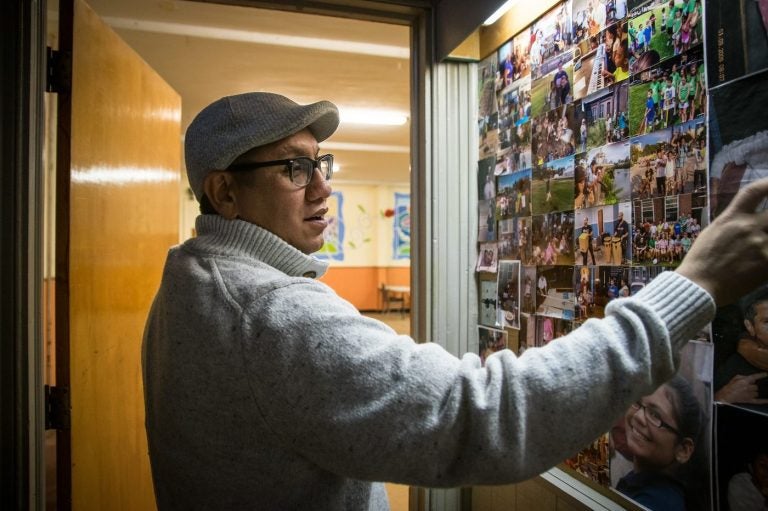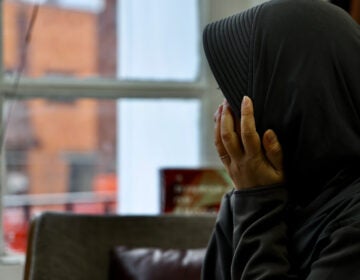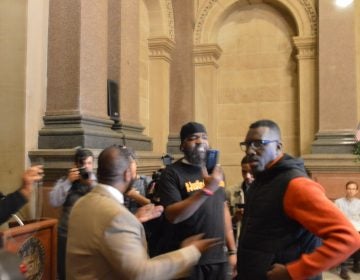Tireless minister who once worked in Bryn Mawr now battles poverty in Kensington
Ten years ago, the Rev. Adan Mairena decided to leave the Main Line majesty of Bryn Mawr Presbyterian Church to minister to people living in poverty in Kensington.

Rev. Adan Mairena left a church in Bryn Mawr to minister to people in poverty in Kensington (Erin Blewett/Philadelphia Inquirer)
Ten years ago, the Rev. Adan Mairena decided to leave the Main Line majesty of Bryn Mawr Presbyterian Church to minister to people living in poverty in Kensington.
“In one day,” said Mairena, a Honduran-born, second-generation preacher, “I went from first world to the third. From Renoirs on the walls to people with no running water — in 15 miles.”
Ask him why and Mairena, 45, will tell you that he had little choice. A place, he’ll say, chooses you: “The electricity of the neighborhood, that urban feel. The sounds, the diversity, and the people who look like me.”
That, and there was just so much more to be done in Kensington, where hunger and meager chances have made life endlessly difficult for people — many of them Latino — searching for something better.
So Mairena founded the West Kensington Ministry in 2008, officially closing Norris Square Presbyterian Church in the process. The ministry is housed within the enormous, faded sanctuary dating from 1860. It’s replete with bullet holes in the stained glass, disconnected organ pipes, and endless, unfillable rows of wooden pews. Mairena’s congregation of around 200 remains part of the Presbytery of Philadelphia.
As though chasing away the ghosts of Civil War soldiers and 19th century burghers, the 5-foot-9, 200-pound Mairena has pierced the quiet, dusty darkness with the sounds of table saws, his Bryn Mawr-donated Fender Stratocaster guitar (to lead his Christian rock band), and a new style of preaching.
“Jesus was down with the homies,” Mairena intoned one day, standing before a painting of a Latino Jesus being hugged by a penitent young man. “And we must follow his philosophy of loving your neighbor and feeding the poor.”
But these days, Mairena acknowledges, even that is not nearly enough.
For his flock, Mairena has created a silkscreen business; a recording studio; a playhouse for neighborhood thespians; a concert venue for local musicians; a mentoring place for teenagers; a community kitchen; a food pantry; an occasional dining spot; a community wood shop; and a pottery studio.
Money is always tight. But right after he thanks God, Mairena gives props to the Presbytery of Philadelphia, as well as Presbyterian churches around the region whose congregations most recently have allowed the Kensington ministry to have a dishwasher, a stove, plumbing, new walls, and a freezer.
“So many partners deem this place worthy,” Mairena said. “And I thank them.”
Unequaled Passion
Mairena is driven by an unequaled passion for his community, said Amy Yang, a family therapist who is helping him create a mentoring program for low-income children ages 10 to 16 by matching them with adults who meet with them weekly and take them to museums, parks, and libraries.
“He made this church a hub for the community,” Yang said. “He really cares. You can memorize the entire Bible but not really know it, if you’re not living what Jesus taught.”
With all his efforts, Mairena has seen several of the kids he has helped go on to college. A few more hold down good jobs in the city.
His faith drives him, a faith he inherited like a legacy from his parents, both of whom were ministers. Mairena was just 4 months old when his family immigrated to Chicago. His father was forced to flee Honduras after he heard that he was on the “black list,” a compendium of enemies of the state who had spoken against the government. Friends’ bodies had been thrown into rivers. Mairena’s dad was assured his would be next.
“The most important people in my life have served others,” Mairena said, “through their faith and altruism.”
But Kensington can test that faith.
How the death of a young neighborhood man named Jon Bey didn’t chase Mairena back to Bryn Mawr, people who know the minister swear they cannot say.
As Mairena tells it, Bey, 18, was sitting on a stoop, live-chatting with a man on his laptop, one spring day. The guy in cyberspace wound up chiding Bey, challenging his manhood.
Bey was with a friend who had a gun. The friend had told Bey it wasn’t loaded, Mairena said. For reasons no one will ever know, the online guy ultimately told Bey that a real man would take out the gun and put it to his own head.
Bey complied. “Now pull the trigger,” the guy said.
“That was June 6, 2012,” Mairena said. “John used to be here every day. He called me ‘Uncle.’ I’d give him pizza and he’d mop the floors, singing, wearing gloves even in the summer. I just….” Mairena couldn’t continue.
Mairena held a funeral service for 200 mourners. He asked some of Bey’s friends to write messages on 100 red balloons — “Jon, keep singing” was one. The balloons were released into a graying sky as people stood at the old church’s rusted iron gate, a grand gesture for a pointless death.
“When it comes to poverty, there’s just so much in this community,” Mairena said. “And with it, there’s so much violence.
“I’m still disappointed in myself for not keeping Jon safe enough.”

Throughout the last 10 years, Mairena has developed a soft spot for all who are down on their luck. That describes John Fortune, the ironically named 50-year-old who commutes from Norristown to Kensington for drug rehab and time at the ministry.
“I like getting involved here,” said Fortune, who describes himself only as a former graffiti artist.
“I let myself loose here with a tambourine and praise the Lord when we sing,” he said. “This church accepts who you are. Rev. Mairena is real, not microwaved. His church is this community’s glue.”
Then, suddenly, as though believing he said too much, Fortune started to cry. “Am I coming across OK?” he asked Mairena, his guide and guru.
“Yes, you’re a positive, joyous guy, John,” Mairena assured him. “You’re good.”
Changing Neighborhood
As tough as the neighborhood is, it’s changing. Gentrification is turning Kensington into something new, something everyone who lives there is worried about.
“They’re putting in 40 new apartments next door,” Mairena said. “But deep poverty is still here, hidden in the crazy development we’re seeing. People are still hurting.”
In recent years, Mairena has become more involved with helping undocumented immigrants in the region. His church took Angela Navarro, a Honduran mother, into sanctuary for two months at the end of 2014 and the beginning of 2015. She eventually won a reprieve from deportation.
Mairena has lately been leading congregants on mercy missions to bring food to heroin-addicted people living on Kensington streets. “We don’t go there to save or convert,” he said. “Just to love them.”
That kind of straightforward ministry attracts all sorts of people, said Dawn McCloud, 49, who was born into poverty in Kensington and moved to New York. She’s had careers in fashion and real estate and now works with Living Elements, an education and training program in Philadelphia. She lives in Kensington again and is volunteering to be a mentor for Mairena’s ministry.
“Adan shoots from the hip,” she said. “He’s very disarming and genuine. He sees such immense need here. He really knows the people he’s trying to reach.”
Usually, Mairena said, an urban preacher burns out after three years. That he has more than tripled that tenure makes Mairena wonder how much longer he’ll last.
All that time has taken its toll. Mairena was married once, but, as he put it, “I’ve had to make sacrifices for this job.”
Still, he said, “I can’t leave yet. If it falls apart right after you go, it means you’ve failed.”
So Mairena remains, staving off failure, beating back poverty where he can.
“We’re not solving all the problems,” he said. “But we keep getting up each day. And trying to get some wins.”
Philadelphia Media Network is one of 21 news organizations producing Broke in Philly, a collaborative reporting project on solutions to poverty and the city’s push toward economic justice. See all of our reporting at brokeinphilly.org.

WHYY is your source for fact-based, in-depth journalism and information. As a nonprofit organization, we rely on financial support from readers like you. Please give today.



